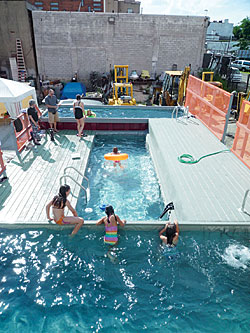
Last summer, when real-estate developer David Belt turned some recycled wood and three Dumpsters into a set of swimming pools next to the Gowanus Canal, he envisioned the place as a makeshift urban oasis for him and his friends, and if other people came through word of mouth, so be it. But this is New York: There are a lot of mouths. Soon the pool had become the Soho House of the Great Recession. Hordes of sweaty hipsters were showing up on the weekends, putting Belt in the unenviable position of turning people away. “I was accused of being elitist, like I was running a country club,” he says. “But it was illegal. It wasn’t like a public pool.” This summer, his company Macro-Sea is working to secure the necessary permits to go public. A four-Dumpster-pool complex will be resurrected near the original location on the canal. The company will also introduce a few mobile “temporary environments” on trucks in other cities this summer. The recession, he says, has given him more to work with. “There are a lot of empty lots now that would maybe one day turn into condos. And everyone has more time. It’s making a lot of people’s creativity bubble up in different ways.”